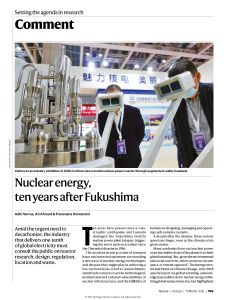
Nuclear Energy, Ten Years after Fukushima
Amid the urgent need to decarbonize, the industry that delivers one-tenth of global electricity must consult the public on reactor research, design, regulation, location and waste.
Recommendation
As global warming demands more intense decarbonization, scientists focus on nuclear power as part of the solution. While serious issues of waste storage and disaster potential persist, engineers are designing safer, more efficient nuclear power plants. Meanwhile, industry pundits work harder than ever to educate a skeptical public about nuclear safety and cost. This Nature commentary provides a multifaceted discussion of the lingering questions about the viability of nuclear power as a safe, essential energy source in a warming world.
Summary
About the Authors
Aditi Verma is a Stanton University nuclear security fellow. Ali Ahmad is a Stanton University nuclear security fellow. Francesca Giovannini is executive director of the Project on Managing the Atom at the John F. Kennedy School of Government, Harvard University.

Comment on this summary